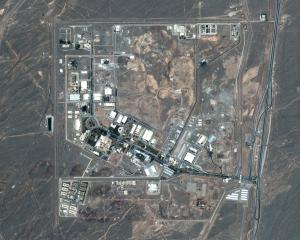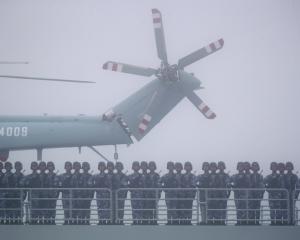Environmental disasters happen somewhere else, do they not?
This seemed the unspoken assumption behind the almost lackadaisical response last week to the news that a container ship had run aground on the Astrolabe Reef 20km off the Bay of Plenty coast and had begun leaking oil. It was not until Prime Minister John Key took a helicopter ride out over the stricken and listing ship Rena that a country more concerned with the state of Daniel Carter's strained groin began to sit up and take notice. That followed almost four full and calm days in which very little in the way of remedial action appeared to happen.
The arrival of large globs of tar-like oil deposits on the sands of one of the North Island's favourite summer beaches, Mount Maunganui, confirmed that for some at least there was life - and consequences - beyond winning or losing the Rugby World Cup. The oil has continued to pour out of the Rena and some estimates suggest will be washing up on the pristine sands of Bay of Plenty beaches for some time to come. Those working in the tourism industry are in no doubt that this event is already a disaster and with rough seas predicted over the next day or two that the threat could get worse before it gets better.
By late yesterday between 200 and 300 tonnes of oil had leaked out of the vessel. Maritime New Zealand had scrambled oil recovery teams to collect oil spilling from the ship; and fuel vessel Awanui, which had arrived in the vicinity to help offload the remaining 2000 tonnes of oil from Rena, was not on the water yesterday because of damaged received on Monday.
Among the many questions the incident prompts are, crucially, how did such a large vessel run into a well-known and marked reef?
Did it have the requisite navigational aids and if so were these functioning properly?
How competent are the ship's officers and captain?
And does New Zealand have the wherewithal to respond with alacrity to such potential sea-borne disasters?
Inquiries now under way will shed light on these issues, but the immediate past safety and inspection records for Rena do not augur especially well.
In July, Australian authorities detained the Rena after deficiencies were found, although it was also conceded that such detention was not uncommon. Warnings were also given following a further inspection in Bluff about 12 days ago. Maritime New Zealand said authorities had found the Rena's safety checklist was not working effectively. Whether any of this had any impact on or connection with the disastrous stranding has yet to be revealed and will be known with certainty only when the inquiries report back.
While Maritime New Zealand clean-up operations swing into action in attempts to minimise the on-shore pollution, the longer-term fallout from the incident is hard to predict. The spectre of summer beaches unable to be used because of remnants of aggregated tar-like oil deposits will give potent ammunition to those concerned about the potential for disaster from off-shore oil drilling.
Environment Minister Nick Smith will have to work hard to persuade those people that sufficient safety valves and local expertise are in place to safeguard the pristine coastline. Should this oil leak get much worse in the coming days and weeks the electorate may go to the polls with more than a Rugby World Cup result on its mind.
And another thing
Perhaps it was the "end-of-term" atmosphere in the House that finally got to John Key. For it now seems that he was at best very sloppy when he suggested the ratings agency Standard and Poor's, at a meeting in New Zealand about a month ago, had said "if there was a change of government that the downgrade would be much more likely".
This, he now admits, was an "inference" taken from the meeting and subsequently relayed in an email to the Prime Minister. The Labour Party claims that in presenting that information to the House as something more than this, Mr Key misled the House. Fortunately for Mr Key it is an accusation he will not have to answer to in person - in this term at least.











